Marine Life & Conservation
Renewing our Coral Reefs
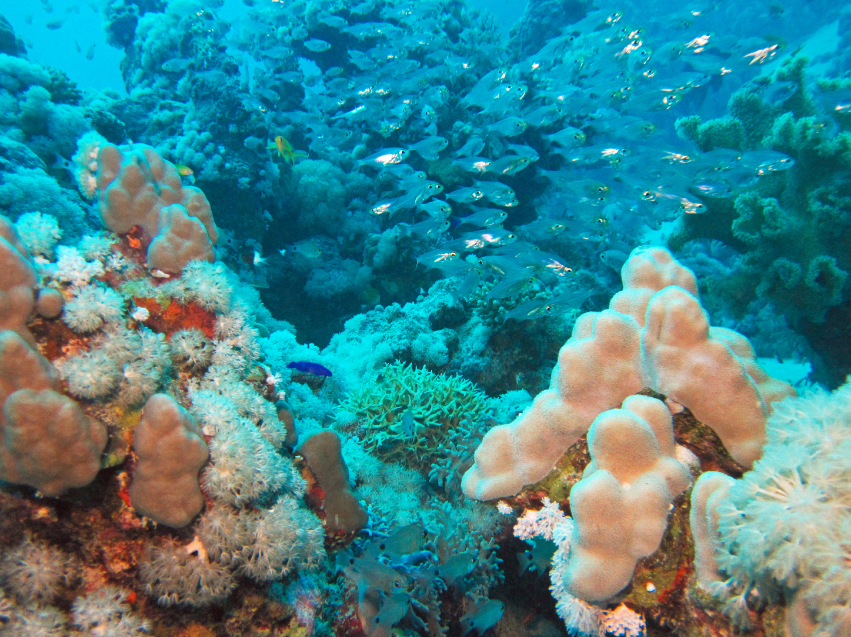
With the mass destruction of coral reefs around the world due to climate change, destructive fishing methods, irresponsible boat anchoring, pollution or just careless divers, the short of it is, we are loosing a significant percentage of reef every year. There are many facts and figures on many different web sites, all putting some sort of spin on what we have lost and what we are about to loose in the future. Whatever the figures, the fact remains that we are loosing a unique and incredible part of this world’s ecosystem. I’m not just being sentimental here; the World Meteorological Organization says that tropical coral reefs yield more than US$30 billion annually in global goods and services, such as coastline protection, tourism and food.
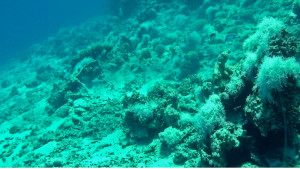 As divers, many of us have seen the loss ourselves, returning to areas we visited years previously, only to find the coral dying or dead and not a fish in sight except perhaps for the lonely few.
As divers, many of us have seen the loss ourselves, returning to areas we visited years previously, only to find the coral dying or dead and not a fish in sight except perhaps for the lonely few.
There are people in the world taking a positive stance against this who are not only contributing greatly to the growth of new reefs but also helping people, locals and visitors, to feel some sense of ownership and take part in the saving of our seas.
This, on the face of it, is good news, but let’s not fall into the trap of thinking that when it all goes pear shaped we can simply re-build. We can’t. This article is about restoration, not creation.
THE GILI ECO TRUST (www.giliecotrust.com)
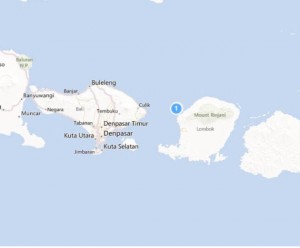 The trust was created in 2001 by the dive shops on Gili Trawangan to support SATGAS, an association of local security which was struggling against dynamite and cyanide fishing and its disastrous effects on the coral reefs.
The trust was created in 2001 by the dive shops on Gili Trawangan to support SATGAS, an association of local security which was struggling against dynamite and cyanide fishing and its disastrous effects on the coral reefs.
However, because of all the factors of destruction that touch coral, protecting the reefs is not enough. In 2004 the Gili Eco Trust launched its cutting-edge Coral Reefs Restoration Program based on the BioRock technology.
BioRock technology relies on a very simple principle: reproduction by electrolysis of the natural reaction occurring between coral, sea water, the sun and dissolved minerals. A metal structure is installed on the ocean floor. A low voltage electric current, which is totally harmless for any organism, is passed through the structure and leads to electrolysis, causing a calcareous precipitation on the whole structure. This not only avoids the unwanted appearance of rust which would weaken the structure, but, as coral’s skeleton is made of calcium, the structure will, thanks to this reaction, become a favourable base upon which coral may develop.
Loose corals are then manually attached to the structure and typically grow 2 to 6 times faster than usual and are more resistant than under normal conditions, allowing the ecosystem to replenish itself and develop. The corals that are attached come from reefs in the surrounding area that were broken for various reasons such as unaware divers, strong waves or dropped anchors.
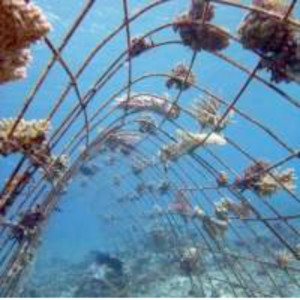
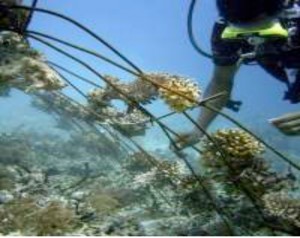 BioRock technology’s electrolysis is catalysis of the natural reaction and not only a simple reproduction, as this electrolysis enables a coral’s development to be 2 to 6 times faster than in usual conditions. Normally coral grows only a few centimeters per year and so quicker growth is an efficient way to restore reefs. Moreover coral on BioRock structures grows stronger and is more resistant to the hazards it faces.
BioRock technology’s electrolysis is catalysis of the natural reaction and not only a simple reproduction, as this electrolysis enables a coral’s development to be 2 to 6 times faster than in usual conditions. Normally coral grows only a few centimeters per year and so quicker growth is an efficient way to restore reefs. Moreover coral on BioRock structures grows stronger and is more resistant to the hazards it faces.
Hard corals are not the only ones to grow on BioRock structures: tunicates, bivalves, sponges and soft corals also come to develop at speeds higher than the average. On a BioRock structure, their survival and resistance rate is 20 to 50 times higher than in the natural environment.
Delphine Robbe, from France, is a Gili Eco Trust Coordinator. This is her blog.
The 8th Indonesian BioRock Coral Reef Restoration, Fisheries Habitat Restoration, and Shore Protection Training Workshop, was held at Gili Trawangan, Lombok, from November 12th-18th 2012, with the kind support of the Gili Eco Trust and the entire Gili Trawangan community.
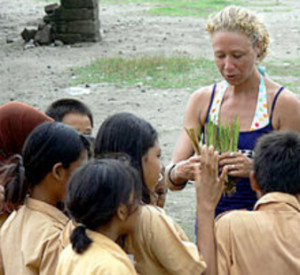 This was the 4th BioRock workshop I had organized and I was feeling a bit stressed out. Not as usual with a coming workshop, stressing about the organization of the event, but because my new born son was only 2 months old and I didn’t know how I would be able to manage a baby and a workshop at the same time. Evan is now my new priority, just before Coral Reefs and my job as Gili Eco Trust Coordinator.
This was the 4th BioRock workshop I had organized and I was feeling a bit stressed out. Not as usual with a coming workshop, stressing about the organization of the event, but because my new born son was only 2 months old and I didn’t know how I would be able to manage a baby and a workshop at the same time. Evan is now my new priority, just before Coral Reefs and my job as Gili Eco Trust Coordinator.
I organize BioRock workshops every 2 years. The last one in 2010 was a great success, but how tiring it was for me to run around, organizing day by day all the activities for the 78 participants. Welding BioRock structures, sinking them, catching up on construction when participants are listening to Tom Goreau’s Lectures lectures, getting the program done for every day jobs that the participants are doing, making sure every group learns the same and have a look at all the different maintenance and construction jobs that BioRock involves…etc
How would I deal with all of that with Evan who needs me for feeding and mainly for love to grow up peacefully? For once I asked for HELP and I delegated! So many people, friends and family had been telling me that I should get some help, delegate and in doing so minimize my stress input, so I finally did it and learned from it! I nominated 12 team leaders to take the 4 teams of BioRock participants into all the activities, I supervised most of the construction but I mostly told the team leaders every night what they were supposed to do the next day. I set the program up for each day and went to give main briefings to the teams going diving, but I was not there all the time and everywhere. I did the first 2 days for all registration, payments and dealing with all the officials and everyone’s bookings. Then I would go there with Evan to set the program up and brief the team leaders. And yes everyone learned everything that they were supposed to learn during that workshop and only positive feedbacks came to us.
The head of the 3 Gili Islands opened the workshop, along with Pak Yes, Head of the Marine Affairs and Fisheries Department from Kupang, Nusa Tenggara. Bapak Arifin Bakti, lecturer at Mataram University (UNRAM) also gave a speech of introduction and I introduced everyone with the program of activities that will be done during this workshop week.
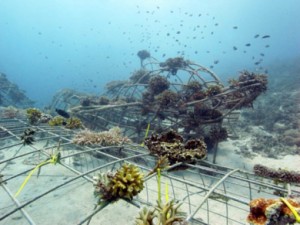 The youth association of Gili Trawangan and the staff of the BKKPN office for Gili Matra, Marine Protected Area, were presented to all participants as the future of the Gili Islands. An uncertain future, as it is difficult to balance tourism and environment protection, but some from local communities want to push towards Eco tourism and coral reef protection and restoration.
The youth association of Gili Trawangan and the staff of the BKKPN office for Gili Matra, Marine Protected Area, were presented to all participants as the future of the Gili Islands. An uncertain future, as it is difficult to balance tourism and environment protection, but some from local communities want to push towards Eco tourism and coral reef protection and restoration.
More than 83 people participated in the Workshop, including a wide range of divers, students, conservationists, scientists, engineers, artists, doctors, and lawyers from all over the world.
As usual, a good majority was from Indonesia. They included more than 10 students in Marine Science, Biology, and Fisheries at Mataram University, Lombok, all of who were trained as divers for the workshop. All of them are planning BioRock related research projects. There were also participants from Bali, Java, Sulawesi, and other islands.
Local people from Gili Trawangan island came to learn about the Biorock technology that they have seen installed around their island over the last 8 years; members of the island Youth Association “Remaja, Karang Taruna”, SATGAS (community ocean patrol that prevents fishing with bombs and poisons, and anchoring in restricted zones), staff from all Gili Trawangan Diveshops, locals and westerners.
Besides Indonesia, participants came from many parts of the world such as Australia, Germany, France, Morocco, Holland, USA, England, Mexico, Sweden, Philippines, Hawaii, Singapore, Austria, and Greece.
Students learned all aspects of BioRock® Technology theory and practice, including the fundamental physics, electrical engineering, mechanical engineering, chemistry, and biology, along with hands-on training in design, construction, installation, monitoring, maintenance, and repair. They saw documentary films and heard lectures on the latest developments in marine ecosystem restoration. They saw the dramatic growth of corals and fish populations on BioRock reefs ranging in age from 0 to 8 years, and the BioRock shore protection projects that are growing back beaches on the north end of the island that had been severely eroding.
13 new BioRock reefs were designed, built, installed, and planted with corals by the students, bringing the total of BioRock reefs at Gili Trawangan up to nearly 78. These are located in front of dive shops, restaurants, and hotels of Gili Trawangan. The total Gili reef restoration structure is now a whole dive site and many spots for snorkelling where tourists can enjoy observing BioRock structures and their inhabitants. The BioRock projects at Gili Trawangan now rival the Karang Lestari BioRock project in Pemuteran, Bali as the world’s largest and most spectacularly successful coral reef restoration project.
BioRock is the only method that increases coral growth rate and resistance to environmental stress, so BioRock reef corals bleach less, recover faster, and have higher survival from global warming-caused heat stroke. This course came at a very critical juncture, because 2012 is the hottest year in history, and severe coral bleaching took place across the entire Indian Ocean, South East Asia, the West Pacific, Persian Gulf, and Caribbean this year, including Lombok.
Water temperatures throughout Indonesia and many of the most important coral reefs in the world, now remain several degrees warmer than average, and will start to bleach in the next few months if this continues. If it is as severe as is expected, only places with BioRock Coral Arks will have much coral, fish, and beaches afterwards.
BioRock graduates are now trained to restore coral reefs and fisheries, and grow back severely eroding beaches. They can apply these skills as soon as local communities, government policy makers, and international funding agencies recognize the critically urgent need to restore rapidly vanishing coral reefs and the fisheries, shore protection, tourism, and biodiversity services they provide over 100 countries, before they vanish.
Only those with proper BioRock training have the knowledge and skills to implement new projects, and will receive full support with advice, advanced training, and materials needed to start new projects designed to save marine ecosystems from the runaway effects of global warming, global sea level rise, pollution, and unsustainable over-exploitation.
(You can learn more about BioRock at www.giliecotrust.com)
Marine Life & Conservation
Paul Watson Released as Denmark Blocks Japan’s Extradition Bid

Renowned anti-whaling activist Paul Watson has been released from custody in Greenland after spending five months in detention. Denmark’s Justice Ministry rejected Japan’s request for his extradition, citing insufficient guarantees that his time already served in custody would be credited against any potential sentence.
The 74-year-old Canadian-American was arrested on July 21 in Nuuk, Greenland’s capital, when his ship docked to refuel. His arrest was based on a 2012 Japanese warrant related to a 2010 encounter in Antarctic waters. Japan alleged Watson obstructed operations and caused damage to a whaling research ship during efforts to disrupt illegal whaling. Watson has consistently denied these claims, maintaining his commitment to marine conservation.
Denmark, which oversees extradition matters for Greenland, concluded that while the legal conditions for extradition were met, the lack of assurances from Japan regarding time-served credit made extradition untenable.
In a video shared by his foundation, Watson expressed gratitude and relief, saying, “After five months, it’s good to be out… and good to know they’re not sending me to Japan.” He added that the most difficult part of his time in custody was being separated from his two young sons.
Watson is a pioneering figure in marine conservation, known for founding the Captain Paul Watson Foundation in 2022 after decades of activism with the Sea Shepherd Conservation Society. His bold efforts to defend marine life have earned him widespread support, including from celebrities and conservationists. His work has also been featured in the acclaimed reality TV series Whale Wars.
Watson’s lawyer, Jonas Christoffersen, praised the decision, stating, “We are happy and relieved that Paul Watson is now free.” He added that Watson is eager to reunite with his family and continue his vital work.
The arrest occurred while Watson’s vessel, the M/Y John Paul DeJoria, was en route to the North Pacific with a team of 26 volunteers to intercept a Japanese whaling ship. His foundation described the arrest as politically motivated and emphasized that Watson’s actions were focused on ending illegal whaling practices.
Japan resumed commercial whaling in 2019 after leaving the International Whaling Commission, asserting that whale meat is a cultural tradition. Conservationists, however, continue to challenge these practices, highlighting their impact on marine ecosystems.
Despite the challenges, Watson remains steadfast in his mission to protect marine life and bring attention to whaling practices. His dedication to ocean conservation has made him a globally respected advocate for the environment.
Marine Life & Conservation
12 Days of Zero-Waste Fish-mas

This holiday period, the Marine Conservation Society, the UK’s leading ocean membership charity, invites you to make some simple changes to eating fish this Christmas to help our seas.
Dr Kenneth Bodles, Head of Fisheries and Aquaculture at the Marine Conservation Society, said, “During the festive season, our consumption increases, but so does waste. Sustainability isn’t just about where food comes from – it’s also about how you use it. By reducing waste and making the most out of your seafood, you’re not only taking steps to be more ocean-friendly, but can also help to cut costs during what is often one of the most expensive times of the year”.
The Marine Conservation Society has compiled twelve tips on how to consume seafood sustainably with zero-waste this Christmas:
Buy whole fish instead of fillets
Instead of fillets, consider buying whole fish such as salmon, hake, or lemon sole. By adopting a “nose to tail” approach with cooking, whole-baked fish not only feeds a crowd, but also helps to minimise waste and maximise sustainability by using up every part of the animal, including bones, skin, and fat.
Make fish stock
Leftover fish bones or shells can be put to good use by boiling them to make a nourishing fish stock or bisque. This can be frozen and preserved for later use and makes for a flavourful base in a soup.
Make your own fish pâté
Avoid waste by turning leftover fish, such as smoked mackerel or salmon, into a delicious pâté by blending with cream cheese and lemon. Perfect when paired with crackers.
The sustainability of salmon and mackerel varies depending on where and how it is caught or farmed. For more information on green-rated options, check the charity’s Good Fish Guide.
Buy frozen
By purchasing seafood that is frozen or vacuum-packed, this helps to reduce waste by extending the shelf life of your food.
Fish pie
If you’re wondering what to do with leftover cooked fish, why not opt for a classic fish pie with mashed potatoes, leeks, and a cheesy sauce? A sure crowd pleaser on Boxing Day.
Use the head
Don’t forget the fish head! The meat is incredibly tender and flavourful. The charity recommends a cod’s head curry or recreating Fallow’s renowned cod’s head in siracha butter.
By stretching your ingredients further, not only is this a more sustainable way to enjoy seafood, but also cost-effective by repurposing leftovers and cooking creatively.
Boxing Day brunch
Mix leftover kippers or smoked salmon with scrambled eggs for a tasty, zero-waste, Boxing Day brunch.
For best choice, make sure you buy kippers, or herring, from the North Sea and the North Irish Sea.
Zero-waste storage
A top tip from the Marine Conservation Society to avoid waste is freezing fish offcuts to save for future use.
Crisp up the skin
Even leftover fish skin can be turned into a quick savoury snack by crisping it up in an air fryer with a little olive oil and salt.
Anchovies two ways
Leftover anchovies can either be blended with butter to make a delicious anchovy butter or tossed into pasta for a hit of umami flavour.
The charity recommends opting for anchovies caught in the Bay of Biscay for best choice.
Fishcakes
For an easy, zero-waste meal, leftover seafood trimmings can be mixed with mash and fried in breadcrumbs to make fishcakes.
Pickled mussels
Try pickling mussels in 1:1 vinegar and water, with a dash of sugar for a sustainable, zero-waste snack that can be enjoyed well beyond the festive season.
Mussels farmed in the UK are a seafood superhero. Grown using low-impact methods and harvested by hand, they get all the food they need from the sea around them. This makes them one of the most sustainable, ocean-friendly, and cost-effective seafood options.
Players of People’s Postcode Lottery have raised £6.6M towards the Marine Conservation Society’s vital work in making seafood more sustainable.
Laura Chow, Head of Charities at People’s Postcode Lottery, said: “Fish is a festive favourite for many, but making sustainable choices when it comes to how we buy and eat seafood makes all the difference for our ocean. Support from players of People’s Postcode Lottery has helped the Marine Conservation Society further its sustainable seafood work, so that we can all enjoy healthier, better protected seas.”
The Marine Conservation Society encourages you to make sustainable seafood choices a year-round habit, not just for Christmas. To check how sustainable the seafood on your plate is, you can visit the charity’s Good Fish Guide. The Guide helps consumers and businesses identify the most sustainable seafood using a simple traffic light system, based on where and how species are caught or farmed. Green is the best choice, amber means improvements are needed, and red indicates fish to avoid buying.
Zero-waste gift idea
Why not embrace a zero-waste Christmas by gifting a membership to support marine conservation? It’s a meaningful, low-waste gift that helps protect our ocean for generations to come. Memberships start from as little as £5 a month – the price of a sandwich and drink from your local coffee shop.
Find the latest sustainable seafood advice for wild-caught and farmed seafood on the Good Fish Guide, downloadable to your phone from www.mcsuk.org/goodfishguide.
-

 News2 months ago
News2 months agoIconic SS United States to become the World’s Largest Artificial Reef
-

 News3 months ago
News3 months agoBook Review – 52 Assignments: Underwater Photography
-

 Gear News3 months ago
Gear News3 months agoDYNAMICNORD – New German diving brand enters the British market
-

 News3 months ago
News3 months agoExploring Cenote El Pit: A Diver’s Dream
-

 Gear News3 months ago
Gear News3 months agoTry BARE drysuits (and maybe even win one!) this Friday with Sea & Sea at North West Dive Fest
-

 Marine Life & Conservation3 months ago
Marine Life & Conservation3 months agoBook Review: Coral Triangle Cameos
-

 Blogs2 months ago
Blogs2 months agoDive the Egyptian Red Sea this Autumn with Regaldive
-

 News3 months ago
News3 months ago2024 Ocean Art Underwater Photo Competition Announced



